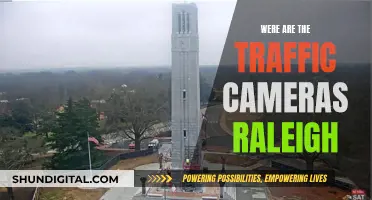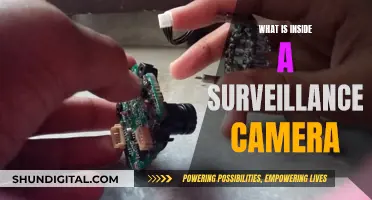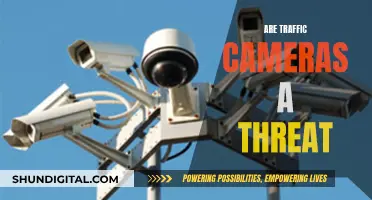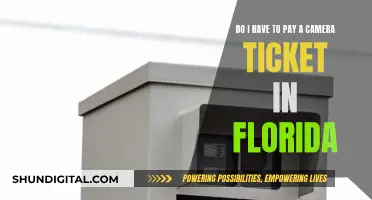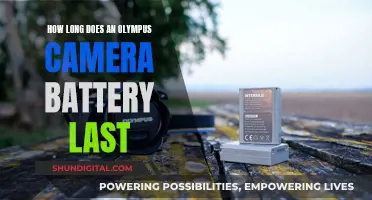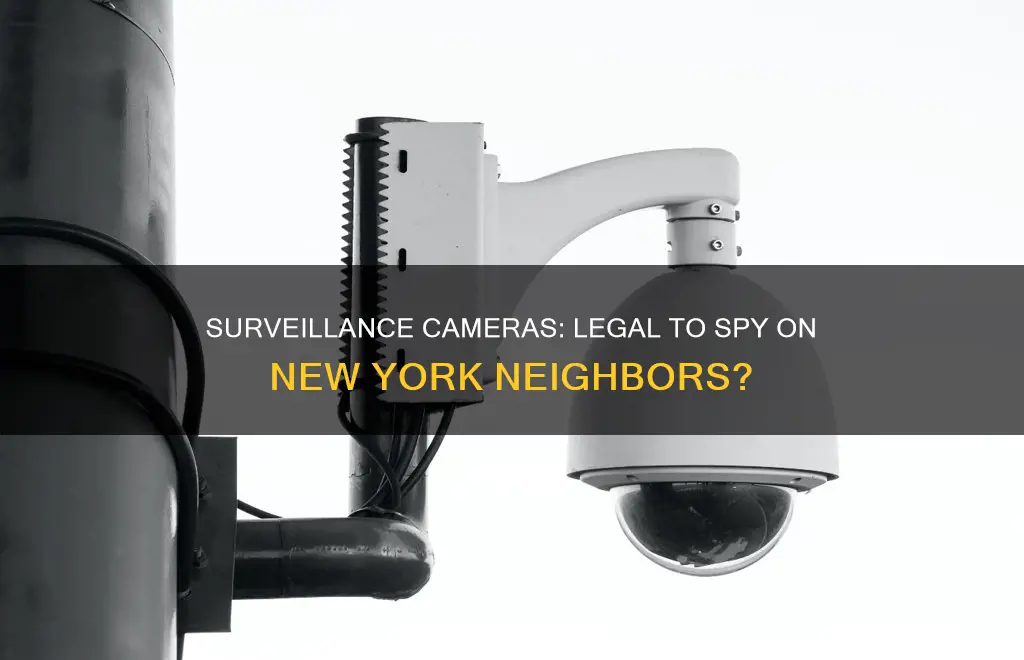
Surveillance cameras are generally legal in New York State, but there are important restrictions to consider, especially in residential areas. While residents have the right to utilise video surveillance on their property, at work, and in public places, they must respect the privacy of others. This includes avoiding pointing cameras at a neighbour's property, such as their backyard, without their consent, as this violates privacy laws. New York State's Civil Rights Law also requires private employers to notify employees of electronic monitoring and obtain their written consent. Unlawful surveillance, including illegal audio recordings, is strictly prohibited and can result in criminal charges and penalties.
| Characteristics | Values |
|---|---|
| Surveillance cameras legal in New York | Yes, generally legal if used for legitimate purposes without violating privacy |
| Surveillance cameras legal in residential areas | Yes, but cannot be placed in private areas like bedrooms, bathrooms, or live-in nanny rooms |
| Surveillance cameras legal outdoors | Yes, but cannot be pointed at a neighbour's property, especially in densely populated areas |
| Surveillance cameras legal for businesses | Yes, but businesses must respect the right to privacy of employees and customers |
| Surveillance cameras legal for law enforcement | Yes, but must comply with the Public Oversight of Surveillance Technology (POST) Act |
| Licence required for surveillance cameras | Yes, a licence is required from the New York State Department of State (NYSDOS) |
What You'll Learn
- Surveillance cameras are generally legal in New York
- You need a license to install surveillance cameras as part of a security system
- Surveillance cameras cannot be placed in areas where privacy is expected, such as bathrooms
- It is illegal to record conversations without consent from at least one party
- Businesses must notify employees about electronic monitoring and obtain written acknowledgment

Surveillance cameras are generally legal in New York
In addition to external cameras, there are restrictions on where you can place cameras inside your residence. Avoid installing cameras in areas where privacy is expected, such as live-in houseworker living quarters or nanny rooms. It's also important to obtain consent before recording audio, as New York is a "'one-party consent' state", requiring the permission of at least one person being recorded.
For businesses and employers, video surveillance is permitted in the workplace, but privacy laws must be respected. Section 203-C of the New York Labor Law prohibits recording in locker rooms, bathrooms, or other changing areas without a court order. Employers must also notify employees about video surveillance and obtain their written acknowledgment, as per New York State's Civil Rights Law.
To summarise, while surveillance cameras are generally legal in New York, it's crucial to be mindful of privacy laws and obtain proper consent to avoid legal repercussions.
Action Camera Car Mode: What's the Deal?
You may want to see also

You need a license to install surveillance cameras as part of a security system
If you are installing surveillance cameras as part of a security system, you need a license issued by the New York State Department of State (NYSDOS). This applies to both residential and commercial properties.
The NYSDOS requires applicants to meet certain education requirements and pass an exam. However, master electricians are exempt from these requirements but must register.
It is important to note that there are specific restrictions on the placement of surveillance cameras in New York. For example, cameras should not be placed in private areas such as bedrooms, bathrooms, or live-in nanny rooms. Additionally, cameras should not be pointed at a neighbour's property without their consent, as this would violate privacy laws.
While video surveillance is generally legal in New York, it is important to respect the privacy of others and obtain their consent if necessary.
Baldur's Gate 3: Exploring the Camera Mode Feature
You may want to see also

Surveillance cameras cannot be placed in areas where privacy is expected, such as bathrooms
Surveillance cameras are generally legal in New York State if used for legitimate purposes without violating privacy. However, there are some key restrictions for homeowners in residential areas.
One of the most important restrictions concerns camera placement. Homeowners should avoid installing cameras in areas where privacy is expected, such as bathrooms, bedrooms, or live-in houseworker living quarters. This restriction also applies to businesses, which are prohibited from recording video of employees or tenants in bathrooms, locker rooms, or other areas where they change their clothes, unless authorized by a court order.
In addition to camera placement, it is important to consider the scope of surveillance. Cameras should only cover your own property and should not extend to neighbouring properties without consent, especially in densely populated areas.
New York State law also addresses the issue of audio recording. To comply with wiretapping laws, homeowners should avoid audio recording their neighbours. New York is a ""one-party consent" state, which means that only one party must permit the recording of an in-person or telephone conversation. However, it is still important to respect the privacy of others and avoid recording conversations without their knowledge or consent.
Overall, while surveillance cameras can be a valuable tool for deterring crime and enhancing security, it is crucial to be aware of and comply with the privacy laws that govern their use in New York State.
Converting to Camera Raw: A Step-by-Step Guide
You may want to see also

It is illegal to record conversations without consent from at least one party
In New York, it is illegal to record conversations without the consent of at least one party. The state is a "one-party consent" state, which means that individuals can record conversations if they are physically in the state and are taking part in the conversation, or if they have permission from one of the parties in the conversation. This applies to both phone calls and in-person conversations.
The law does not allow individuals to record every conversation they hear. It is illegal to record conversations that one is not a part of in New York. The law also prohibits leaving a phone in another room to record people's conversations or wiretapping phones to record calls in which one is not participating.
However, there is an exception to this rule. Individuals can record conversations where there is no reasonable expectation of privacy. For instance, if people are talking loudly in a public place, such as a city street or public plaza, where others can easily overhear them, they do not have a reasonable expectation of privacy, and the conversation can be recorded.
On the other hand, if individuals are in someone's home or chatting softly in a bar's corner, they are likely to have a reasonable expectation of privacy, and recording them without their consent would be illegal.
The consequences of recording conversations without the necessary consent can be severe. It is a Class E felony under New York's wiretapping law, punishable by up to four years in prison and a $5,000 fine. Additionally, illegally recorded conversations are unlikely to be admissible as evidence in court proceedings.
The Evolution of Camera Phones: First Snapshot
You may want to see also

Businesses must notify employees about electronic monitoring and obtain written acknowledgment
In New York, businesses are required to notify their employees about electronic monitoring and obtain written acknowledgment. This law, which came into effect on May 7, 2022, applies to all private-sector employers in the state, regardless of their size or entity type. It is an amendment to the New York Civil Rights Law, focusing on protecting employee privacy, especially with the shift to remote work.
The law mandates that employers provide notice of their electronic monitoring practices to all employees upon hiring. This notification must be in writing or electronic form and should include a statement that any form of electronic communication or internet usage may be monitored "at any and all times and by any lawful means." Additionally, employers must obtain written or electronic acknowledgment from employees upon providing this notification.
To ensure compliance, employers should distribute a notice and acknowledgment form or include such a notice in their employee handbooks. It is also essential to post the notice of electronic monitoring in a conspicuous place accessible to all employees.
The New York State Attorney General is responsible for enforcing this law and can impose civil penalties on non-compliant employers. The penalties increase with subsequent offenses, ranging from $500 for the first offense to $1,000 for the second and $3,000 for each additional violation.
This law grants employees in New York greater transparency and protection regarding their electronic communications and internet usage while at work.
Fine-Tuning Your Axis M3037: Focus Adjustment Techniques
You may want to see also
Frequently asked questions
Surveillance cameras are generally legal in the state of New York, but there are laws in place to protect people's privacy.
It depends on where you live. In New York, it is illegal to point a security camera at a neighbour's property without their consent. However, some states have no restrictions on visual recording, as long as the camera is on the neighbour's property.
Firstly, talk to your neighbour. They might not realise your camera is pointing at your property, or there might be a misunderstanding. If this doesn't work, you could try blocking the camera's view by planting trees or installing a fence. If this also fails, you could contact a lawyer.


